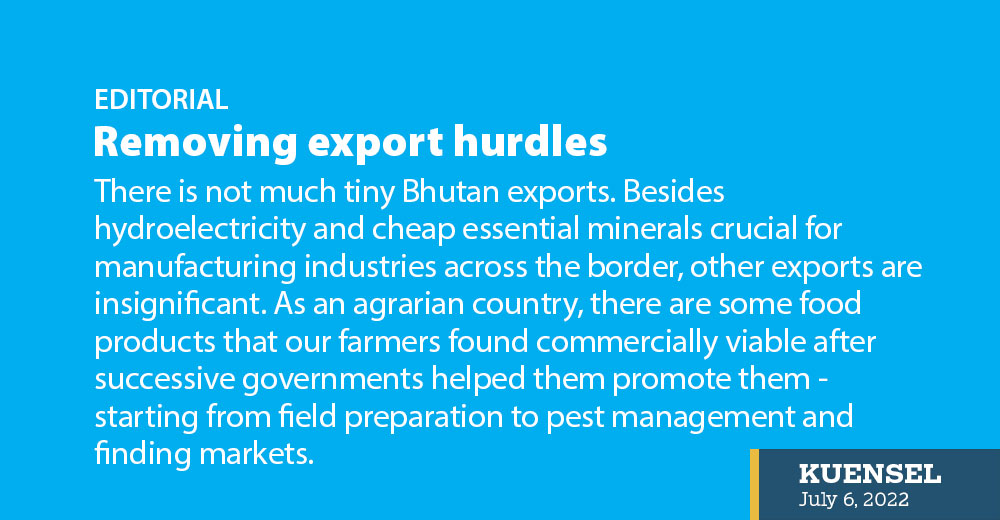There is not much tiny Bhutan exports. Besides hydroelectricity and cheap essential minerals crucial for manufacturing industries across the border, other exports are insignificant. As an agrarian country, there are some food products that our farmers found commercially viable after successive governments helped them promote them – starting from field preparation to pest management and finding markets.
Apples, cardamom, citrus mandarin and potatoes are some cash crops Bhutanese export to our neighbouring countries, particularly India. The seasonality of the agricultural products makes it lucrative for both Bhutanese farmers and Indian importers. For instance, farmers from Phobjikha, Bumthang and Chapcha have enough potatoes to cater to markets in Siliguri or Guwahati. The quantity of export is not enough to go beyond Assam or West Bengal. When hundreds of hectares of fields are inundated from the recurring monsoon floods, Bhutanese exports are a drop in the flood.
Making it hard for limited Bhutanese farm produce is not helping anyone given the market forces of demand and supply. Bhutanese farmers are looking to the government for help to sell their potatoes. Help, fortunately, has arrived because of the “excellent bilateral relations between the two countries.” The ministry of commerce and industry, department of commerce on Monday notified that the import of potatoes from Bhutan is permitted freely, without any license up to June 30, 2023. What will happen from next summer will depend on the excellent relations.
The two friendly countries will always find a way out. Sometimes market forces will determine. Last year, retail inflation of potatoes in India surged from 6.8 percent in April to 11.1 percent in May, according to the State Bank of India. With retail potato prices rising sharply over April and May, the government decided to permit the import of potatoes from Bhutan without any license up to June 30, 2022.
It is said that onions are a hot political potato in India. If very little is cooked without onion, potato is also an integral part of the great Indian dish. Bhutanese potato export, around 20,000 metric tonnes is nothing compared to the demand. It is about 0.04 percent of India’s domestic production. Even if there is a shortage and price escalation, export from Bhutan is so insignificant that it can be sold or bought without any restrictions or licensing regime. The two governments know this well. Perhaps it is the policy makers or the ministry that is not able to clear the hurdles.
Why can’t Bhutan and India have a perpetual agreement on the export of Bhutanese agricultural produce to India, a huge and ever-growing market? If there is anything, we should help promote Bhutanese farmers to grow and export more without any hindrance. This, farmers would feel is a testimony of our good relations.
A good example is the government of India supplying thousands of tonnes of fertilizer and coal to Bhutan. Supplying fertilizers at a concession rate to Bhutan, when there is a global shortage is indeed a testimony of the good relations the two countries enjoy. When the benefits trickle down to the people, farmers in this case, the friendship is valued at the grassroots level.
Given our time-tested relations, we can always depend on our friend, India. Hindering the export of potatoes is not much compared with other areas of cooperation. For instance, hydropower for the energy shocked Indian market.


